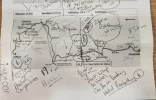I think more than planning and spontaneity, it is about knowing your resources. Talk to other pilgrims. Talk to the hospitalero. Look at Gronze.com. look at apps, planning books. Know a few key phrases. Use Google translate if needed. All these things help with spontaneity. I don't like to lock myself in unless that is important such as an upcoming Spanish holiday or a special place I want to stay such as a paradore, etc.
New pilgrims are limited because they don't use all these resources together and then become frantic the first time something unexpected comes up. It taints their experience and creates a fear so they pre-plan everything for the unforeseeable future.
I couldn't agree more.
I don't think in terms of
planning so much as
preparation, or as you call it, knowing your resources. Research plays a major role for me.
I have a plan in so much as I set my arrival and departure dates based on that research, for example how quickly the majority of people walk my intended route. I book my flights, first and last nights, and then just take it as it comes.
But I can do that because I have resources to hand - not the least of which is experience.
It's something that everybody on this thread has: whether it be lots of camino, travel, or simply life experience (or a combination of all three!) .
From now on, a paper map, compass, paper guidebook and translation book will be with me. And extra charger, cable and waterproof bag for the phone. Most of all, I would like an extra phone, but I understand that is taking it too far. Of other things, not much planning.
I recall the issues you faced, it's something that could happen to anyone that relies on technology. Especially if we haven't familiarised ourselves with it properly first (like many of us nowadays).
I recall that when you got lost you did better
without the phone than with - you gave up relying on the phone and headed for the road that you could hear in the distance, flagged down a car and got assistance.
I carry a notebook with all important information written down, but that's it.
Suggestion: a second phone would be a lot lighter than guidebook, translation book, compass etc. It doesn't have to be expensive just functional, but you do need to know how to use it
before leaving. Plus load all of the relevant apps, and know how to use them too! Battery charged, and stashed away in a ziplock bag to keep dry.
That assumes that you are wanting "good" performance (what ever that is) and that you have some way of measuring "performance".
One possible definition of performance is success or failure in whatever it was you set out to achieve. It can be as complicated as a series of goals to tick off, or as simple as staying alive !
You are able to "just work it out as you need to' because you have the resources to hand. Research, equipment,
experience.... .
These are what enables you to turn a potential problem into "an opportunity to do something interesting".
I think that
@tpmchugh's and
@danielle aird's point is very valid, let's face it everybody on here used to survive perfectly well without all of this tech.
When I first started travelling in the late 80's I bought a ticket somewhere, read a book or two if available, talked to anybody I could find that had been there; possibly visited the local Information Centre upon arrival (if there was one). I seldom spoke the language (in those days I only spoke English) but always had one or two key phrases written down, and made sure to have some local currency (plus a few US dollars stashed away of course). Didn't have any arrows to follow, let alone Albergues to stay at.
I didn't just survive, I thrived.
I sometimes think we over complicate life....





















